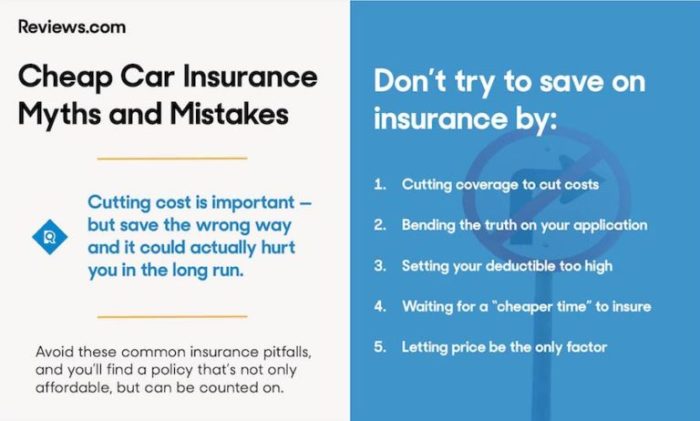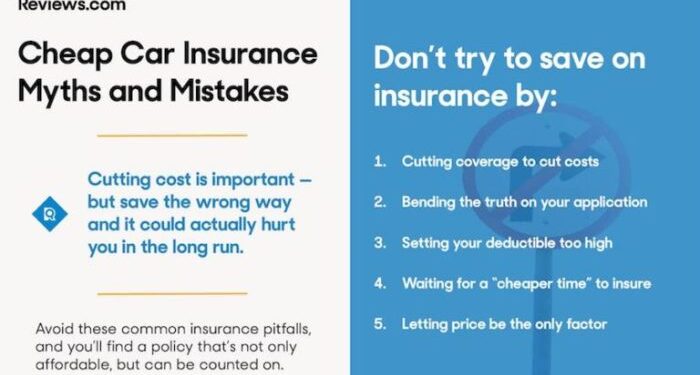When it comes to shopping for car insurance quotes, steering clear of common blunders can make all the difference. Let's dive into the crucial mistakes to avoid and how they can impact your coverage and costs.
Exploring your coverage needs, understanding policy details, and comparing quotes effectively are just a few key steps in the process.
Common Mistakes
When shopping for car insurance quotes, many people make common mistakes that can impact the coverage and price they ultimately receive. Avoiding these mistakes is crucial in ensuring you get the best insurance policy tailored to your needs at the best possible price.
Underestimating Coverage Needs
- Many individuals make the mistake of underestimating their coverage needs when shopping for car insurance quotes. This can lead to inadequate coverage in the event of an accident or other unforeseen circumstances.
- It is essential to accurately assess your coverage needs based on factors such as your driving habits, the value of your vehicle, and your personal financial situation to ensure you are adequately protected.
Not Comparing Multiple Quotes
- Failing to compare multiple car insurance quotes is another common mistake that can result in overpaying for coverage. Each insurance provider offers different rates and discounts, so it is essential to shop around and compare quotes to find the best deal.
- By obtaining quotes from multiple insurance companies, you can ensure you are getting the most competitive rate for the coverage you need.
Overlooking Discounts and Bundling Options
- One of the most common mistakes people make is overlooking potential discounts and bundling options when shopping for car insurance. Many insurance companies offer discounts for things like safe driving records, multiple policies, and vehicle safety features.
- By taking advantage of available discounts and bundling options, you can lower your insurance premiums and save money in the long run.
Coverage Needs Assessment
Assessing your coverage needs before comparing insurance quotes is crucial to ensure you are adequately protected in case of unforeseen events. By evaluating your individual circumstances and understanding the coverage required, you can make informed decisions when selecting a car insurance policy.
Step-by-Step Guide to Evaluate Coverage Needs
- Assess Your Assets and Liabilities: Calculate the value of your car, savings, and other assets to determine the amount of coverage needed to protect them.
- Evaluate Your Driving Habits: Consider factors like daily commute distance, driving frequency, and the area where you drive to determine the level of coverage required.
- Review State Requirements: Familiarize yourself with the minimum car insurance requirements in your state to ensure compliance with the law.
- Consider Additional Coverage: Assess if you need additional coverage options like comprehensive, collision, or uninsured motorist coverage based on your risk tolerance and financial situation.
- Consult with an Insurance Agent: Seek guidance from an insurance agent to understand complex coverage options and tailor a policy that meets your specific needs.
Consequences of Overestimating or Underestimating Coverage Needs
Overestimating or underestimating your coverage needs can have significant consequences when it comes to car insurance. If you overestimate your coverage needs, you may end up paying higher premiums for coverage you don't require, impacting your budget. On the other hand, underestimating your coverage needs can leave you financially vulnerable in case of accidents or damages, leading to out-of-pocket expenses.
It is essential to strike a balance and accurately assess your coverage needs to ensure you are adequately protected without overspending.
Comparison Shopping
When comparing car insurance quotes from different providers, it is crucial to take certain factors into consideration to ensure you are making an informed decision. Here are some key points to keep in mind:
Factors to Consider
- Policy Coverage: Compare the types and limits of coverage offered by each provider to ensure they meet your needs.
- Premium Costs: Look at the total cost of the policy, including any deductibles, discounts, and additional fees.
- Claim Process: Research how each provider handles claims and their reputation for customer service.
- Financial Stability: Check the financial strength ratings of the insurance companies to ensure they can fulfill their obligations in case of a claim.
- Discounts and Benefits: Compare the discounts and additional benefits offered by each provider to see which ones align with your needs.
Apples-to-Apples Comparison Tips
- Use the same coverage limits and deductibles when requesting quotes to make sure you are comparing similar policies.
- Consider the reputation and customer reviews of each insurance company to gauge their reliability and service quality.
- Look beyond the price and consider the overall value of the policy, including coverage options and customer support.
- Ask questions and clarify any doubts with the insurance providers to ensure you have a clear understanding of the policy terms.
Understanding Policy Details
When shopping for car insurance, it is crucial to have a clear understanding of the policy details before making a decision. Failing to do so could lead to misunderstandings and potential issues down the road.
Common Terms and Clauses
- Deductible:This is the amount you must pay out of pocket before your insurance coverage kicks in. It can significantly impact your premium.
- Liability Coverage:This covers damages to other people's property or injuries they sustain in an accident where you are at fault.
- Comprehensive Coverage:This covers damage to your vehicle from incidents other than collisions, such as theft, vandalism, or natural disasters.
Implications of Not Understanding Policy Specifics
Not fully grasping the policy specifics can lead to unexpected costs or denied claims. For example, if you don't understand your deductible amount, you may be caught off guard when filing a claim and realizing you have to pay a significant portion out of pocket.
Discount Opportunities
When shopping for car insurance, it's crucial to explore various discount opportunities offered by insurance companies. These discounts can help you save money on your premiums, so it's important to understand how to qualify for them and maximize your eligibility.
Types of Discounts
- Multi-Policy Discount: Some insurers offer discounts if you bundle your car insurance with other policies, such as homeowners or renters insurance.
- Safe Driver Discount: If you have a clean driving record with no accidents or traffic violations, you may qualify for a safe driver discount.
- Good Student Discount: Students with good grades may be eligible for a discount on their car insurance premiums.
- Low Mileage Discount: If you don't drive a lot, you may qualify for a low mileage discount.
- Affiliation Discounts: Some insurers offer discounts to members of certain organizations or groups.
By taking advantage of these discount opportunities, you can significantly reduce your car insurance costs.
Maximizing Discount Eligibility
- Ask About Available Discounts: When getting insurance quotes, be sure to ask about all the discounts that may apply to you.
- Improve Your Driving Record: Maintaining a clean driving record can help you qualify for safe driver discounts.
- Maintain Good Credit: Some insurers offer discounts to policyholders with good credit scores.
- Take a Defensive Driving Course: Completing a defensive driving course may make you eligible for a discount on your premiums.
Last Word

In conclusion, being mindful of these top mistakes when shopping for car insurance quotes can lead to better coverage and savings. Remember to assess your needs, compare quotes diligently, and grasp policy specifics for a smoother insurance experience.
FAQ Guide
What are some common mistakes to avoid when shopping for car insurance quotes?
Common mistakes include not assessing coverage needs, overlooking policy details, and missing out on discount opportunities.
Why is it important to understand policy details before making a decision?
Understanding policy specifics is crucial to ensure you get the right coverage and avoid any surprises in the future.
How can one maximize discount opportunities when shopping for car insurance?
To maximize discounts, explore all available options, such as bundling policies, maintaining a good driving record, and taking safety courses.











